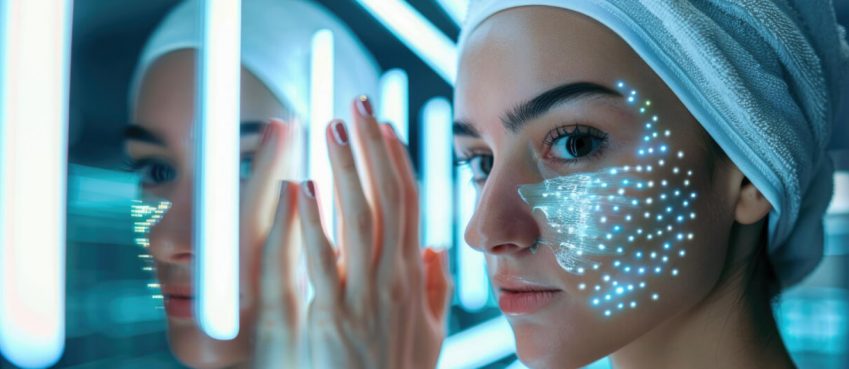
AI and mindfulness may appear unconnected at first glance, but they are increasingly used to support mental wellness.
The ability of machines and computer programs to carry out tasks that would ordinarily need human intelligence is known as artificial intelligence or AI.
On the other side, mindfulness is a state of non-judgment and non-distraction in the present moment.
Researchers and practitioners are investigating fresh approaches to improve mindfulness training, track mental health, and deliver individualized interventions using AI to support mindfulness practices. By combining technology and mindfulness, mental health services could be revolutionized and made more effective and accessible to a wider spectrum of people.
What is Mindfulness?
Mindfulness is all about being in the moment and fully engaged without any distractions or judgments. You can practice mindfulness in so many different ways – from meditation to everyday activities like eating or walking.
It’s seriously amazing because mindfulness has so many benefits! We’re talking about reducing stress and anxiety, improving emotional regulation, boosting concentration and productivity, and even promoting better physical health. By adopting a mindful approach to life, people can experience greater well-being and live more fulfilling lives.
Impact of Mindfulness on Mental Health
- Studies have shown that by being more aware of your thoughts and emotions, mindfulness can reduce symptoms of anxiety and depression, improve your mood, and enhance your overall mental well-being.
- Mindfulness has also been found to improve emotional regulation, reducing the likelihood of impulsive or destructive behavior.
- By practicing mindfulness, individuals can develop a greater sense of self-compassion, reducing self-criticism and increasing self-esteem, leading to a more positive self-image.
The practice of mindfulness can be a life-changing tool for managing mental health and improving the quality of life.
Also read: Snapchat Premium: How To Make A Snapchat Premium App?The Role of AI in Mindfulness
The practice of mindfulness has been around for centuries, but with the help of AI, it can be taken to the next level. Machine learning algorithms offer a new approach to enhancing mindfulness practice, providing personalized recommendations, tracking progress, and even adjusting interventions based on real-time data.
Personalized Mindfulness Apps
One exciting application of AI in mindfulness is the development of personalized mindfulness apps such as Headspace or Calm. By analyzing user data and behavior patterns, these apps can offer customized mindfulness exercises tailored to an individual’s needs and preferences. Real-time feedback and encouragement can also help users stay motivated and engaged in their mindfulness practice.
Wearable Devices
Wearable devices such as smartwatches or biofeedback sensors can also support mindfulness practice. By monitoring biometric data like heart rate variability and respiration rate, wearables can provide real-time feedback on the effectiveness of mindfulness techniques. Additionally, these devices can offer gentle reminders to take a mindful breath or provide guided meditations to help individuals stay focused and engaged.
Clinics
AI can also support the delivery of mindfulness interventions in clinical settings. Machine learning algorithms can analyze patient data and predict which individuals are most likely to benefit from mindfulness interventions, enabling healthcare providers to better target their interventions and improve outcomes for patients.
Overall, AI has the potential to revolutionize the field of mindfulness by providing new tools for personalization, feedback, and intervention. By leveraging the power of machine learning algorithms, individuals can enhance their mindfulness practice and achieve greater mental well-being.
Also read: What Is Walmart Call Out Number? How To Calling Out At Walmart?Potential Benefits of Using AI for Mindfulness
1. Personalization
AI-powered mindfulness solutions can provide personalized recommendations and interventions based on an individual’s unique needs and preferences. By tailoring mindfulness exercises to an individual’s goals, challenges, and preferences, AI can help individuals achieve greater engagement and motivation in their mindfulness practice.
2. Real-time Feedback
AI can provide real-time feedback on the effectiveness of mindfulness techniques, helping individuals identify areas for improvement and make adjustments to their practice. By providing immediate feedback on biometric data such as heart rate variability, AI-powered mindfulness tools can help individuals stay focused and engaged in their practice.
3. Scalability
AI-powered mindfulness interventions can be scaled to reach a larger population of individuals. By leveraging machine learning algorithms, mindfulness interventions can be adapted to suit different contexts and populations, making it easier to provide effective interventions to a wider range of individuals.
4. Predictive Analytics
Predictive analytics in AI solutions can help in identifying individuals who may be at risk for mental health issues and provide targeted interventions. By analyzing data patterns, machine learning algorithms can identify individuals who may need additional support and provide personalized interventions to prevent the onset of mental health issues.
Also read: What Is The Best Time ⌛ and Day 📅 To Post On Instagram? It Is Definitely NOT ❌ Sunday (A Complete Guide)Challenges and Limitations of AI in Mindfulness
1. Ethical and Privacy Concerns
Although AI-powered solutions for mental health show enormous promise, there are also ethical issues to take into account. The potential for bias in AI algorithms, which could maintain or even magnify current social inequities in mental health care, is one of the main concerns. Moreover, privacy and data security issues are brought up by the usage of personal data in AI-powered interventions.
2. Lack of Human Connection
AI-powered mindfulness tools cannot replace the human connection and support that is often crucial in mental health care. While AI can provide personalized recommendations and interventions, it cannot replace the empathy and emotional support that individuals may need.
3. Risk of Over-Reliance
There is a risk that individuals may become overly reliant on AI-powered interventions, potentially undermining the importance of self-awareness and self-regulation skills in mindfulness practice.
4. Limited Context
AI algorithms may have limitations in understanding the full context of an individual’s mental health challenges. While AI can provide data-driven insights, it may not be able to capture the full complexity of an individual’s unique circumstances.
5. Accessibility Barriers
Not everyone may have access to the necessary technology or resources to benefit from AI-powered mindfulness tools. This could create inequalities in mental health care access and outcomes.
Also read: DDR4 vs DDR5: Tech Differences, Latency Details, Benefits & More (A Complete Guide)Examples of AI-Powered Mindfulness Tools
-
Headspace:
Headspace, the go-to mindfulness app for many, leverages the power of AI to craft custom-tailored recommendations for its users. With a plethora of guided meditations and breathing exercises available, users are sure to find something that suits their needs. And with the ability to track progress and offer gentle reminders, Headspace makes it a breeze for users to stay motivated and engaged in their mindfulness practice.
-
Muse:
Muse is a wearable device that tracks your brainwaves and gives you real-time feedback on your mindfulness practice. This cool device uses biofeedback sensors to provide you with auditory cues and helps you stay focused. With Muse, you can also analyze your progress over time and even access guided meditations and mindfulness exercises.
-
Calm:
Calm, the magnificent mindfulness app, is the epitome of AI-powered personalization, offering a diverse range of guided meditations, sleep stories, and breathing exercises to users. With its powerful features, Calm not only helps individuals track progress and set goals but also provides real-time feedback on biometric data such as heart rate. Whether you’re seeking to unwind, relax, or improve your mental well-being, Calm is the perfect solution for you.
-
Mindstrong:
Mindstrong is an AI-powered mental health platform that’s taking the world by storm! Using smartphone data, this innovative platform can monitor mental health symptoms and offer personalized interventions that really hit the spot. And how does it do it, you ask? By analyzing patterns in behavior with the help of machine learning algorithms, of course! Mindstrong is a true game-changer in the field of mental health, with studies showing its effectiveness in treating depression, anxiety, and other conditions.
Future of AI in Mindfulness
The potential for AI and mindfulness is broad and exciting as AI technology develops. The combination of AI with virtual reality (VR) and augmented reality (AR) technology is one promising future application. This might result in the development of individualized, highly immersive mindfulness practices that would improve practice engagement and provide a deeper understanding of one’s own mental state.
Furthermore, AI-powered mindfulness tools may progress even further, utilizing cutting-edge algorithms and machine learning to deliver recommendations that are more precise and unique to the user. When more information about people’s mental health is gathered, AI may be better able to anticipate and prevent mental health issues.
Final Thoughts
It is abundantly evident that AI has a bright future in promoting mental health. With the incorporation of AI, mindfulness techniques may become more individualized, available, and efficient techniques may become more individualized, available, and efficient with the incorporation of AI.
Real-time stress management, anxiety reduction, and other mental health support might all be provided via AI-powered mindfulness tools, along with individualized interventions catered to each user’s specific need.
The use of AI in mental health must, however, take ethical issues into account as well, it is significant to note. For instance, there are issues with algorithmic bias, data security, and privacy. It is essential to make sure AI is utilized morally and responsibly, with measures in place to protect people’s rights and well-being.
AI has enormous potential to improve mental health, but it is crucial to use caution and care while using this technology. The field of mental health care could be completely transformed by AI-powered mindfulness tools, but it is up to us to make sure that these tools are used in an ethical and efficient manner. We can change the way we think about mental health and build a more welcoming and compassionate environment for everyone by fusing the strength of AI with the wisdom of mindfulness.
Top 10 News
-
01
Top 10 Deep Learning Multimodal Models & Their Uses
Tuesday August 12, 2025
-
02
10 Google AI Mode Facts That Every SEOs Should Know (And Wha...
Friday July 4, 2025
-
03
Top 10 visionOS 26 Features & Announcement (With Video)
Thursday June 12, 2025
-
04
Top 10 Veo 3 AI Video Generators in 2025 (Compared & Te...
Tuesday June 10, 2025
-
05
Top 10 AI GPUs That Can Increase Work Productivity By 30% (W...
Wednesday May 28, 2025
-
06
[10 BEST] AI Influencer Generator Apps Trending Right Now
Monday March 17, 2025
-
07
The 10 Best Companies Providing Electric Fencing For Busines...
Tuesday March 11, 2025
-
08
Top 10 Social Security Fairness Act Benefits In 2025
Wednesday March 5, 2025
-
09
Top 10 AI Infrastructure Companies In The World
Tuesday February 11, 2025
-
10
What Are Top 10 Blood Thinners To Minimize Heart Disease?
Wednesday January 22, 2025







